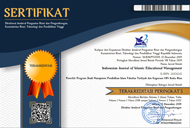Faktor Kunci Dalam Menetapkan Biaya Operasional dan Biaya Investasi di Pondok Pesantren
Abstract
Improving the quality of Islamic boarding schools can be illustrated through the effectiveness and cost efficiency of the existing education process. Meanwhile, determining education costs which include operational and investment costs is seen as less effective and efficient, even though these two costs are a guarantee of the quality of education. However, a number of Islamic boarding schools appear to have key factors in determining operational and investment costs within an effective and efficient framework. The aim of this research is to describe the key factors that are effective and efficient in determining operational and investment costs in Islamic boarding schools. The research was carried out at the Al-mukhlishin Islamic boarding school in Ciseeng, Bogor. The research took subjects namely financing managers, educators, school leaders and deputy leaders. A qualitative approach is the choice for data collection techniques, including observational studies, interviews and document studies. There are data analysis steps which are divided into 3, namely: reduction, presentation of findings and verification in the form of conclusions. The research results confirm that operational and investment costs have key factors that must be considered in determining them, namely changes in the student population and increasing educational standards. The implication of the results for education financing managers is that they can consider key factors to be actualized when trying to provide quality education in Islamic boarding schools
Full Text:
PDFReferences
Ahmad, M. 2021. Management of Facilities and Infrastructure in Schools. Akademika: Jurnal Teknologi Pendidikan, 10(1), 93-105. https://doi.org/10.34005/akademika.v10i01.1348
Ali, M. 2014. Metodologi dan Aplikasi Riset Pendidikan. Bumi Aksara.
Arifin, Z. 2011. Penelitian Pendidikan: Paradigma dan Metode Baru. Remaja Rosdakarya.
Armansyahfudin, A., & Mahmud, S. 2020. Manajemen Pembiayaan Pendidikan. Literasi Nusantara.
DePalmer, D. M., Schuldt, S. J., & Delorit, J. D. 2022. A Fuzzy Inference-Based Facility Prioritization Decision Support System for Complex Hierarchical Organizations. Journal of Facility Management Education and Research, 5(2), 37-51. https://doi.org/10.22361/jfmer/147481
Dewi, P. Y. A., & Indrayana, L. 2021. Persepsi Orang Tua Siswa Terhadap Biaya Pendidikan. Ekuitas: Jurnal Pendidikan Ekonomi, 9(1), 69-78. https://doi.org/10.23887/ekuitas.v9i1.27
Diannisa, R., Karnati, N., & Supandi, S. 2022. Management of Educational Facilities and Infrastucture in Islamic Junior High School. Journal of Educational Research and Evaluation, 6(1).https://doi.org/10.23887/jere.v6i1.3
Edwad, Y. R., et al. 2022. The Effect of Education Costs, Promotions and Facilities on Students’ Decisions to Choose to Learn at the Faculty of Medicine, Prima Indonesia University Through Attitude as a Moderating Variable. International Journal of Research and Review, 9(8), 641-649. https://doi.org/10.52403/ijrr.20220850
Fowler, William J. & Monk, David H. 2001. A Primer for Making Cost Adjustments in Education. National for Education Statistics Publishing.
Gobinath, S., et al. 2019. Factors Influencing the Private Cost of Higher Education; the Case of Sri Lanka. International Journal of Learning, Teaching and Educational Research, 18(3),https://doi.org/10.26803/ijlter.18
Haryadi, H. 2009. Administrasi Perkantoran Untuk Manajer & Staf. Transmedia Pustaka.
Hasnida. 2020. Pendidikan Life Skill Santri di Yayasan Yatim Piatu Pondok Pesantren Al Mukhlishin Ciseeng Bogor. Jurnal Emansasi: Jurnal Ilmu Keislaman dan Sosial, 3(2), 1-13.
Helaluddin, H., & Wijaya, H. 2019. Analisis Data Kualitatif: Sebuah Tinjauan Teori & Praktik. Theologia Jaffray.
Kartika, et al. 2023. Pembelajaran Jarak Jauh antar Siswa Sekolah Kota dan Desa di Negara-negara Berkembang selama Pandemi Covid-19. Uwais Inspirasi Indonesia.
Kenayathullah, H. B. 2012. Cost Benefit Analysis in Malaysian Education. Jurnal Internasional: Manajemen Pendidikan, 4(2), 1-18.
Maftuhah., et al. 2021. Madrasah Infrastructure Management before Face to Face Learning in The Pandemic. Al-Tanzim: Jurnal Manajemen Pendidikan Islam, 5(2), 40-51.
Maftuhah, M., Zahruddin, Z., & Nabilah, A. 2023. Kompetensi Kepribadian Guru Perspektif KH Hasyim Asy’ari di Dalam Kitab Adabul Alim Wal Muta’allim. Urwatul Wutqo: Jurnal Pendidikan dan Keislaman, 12(1), 38-56. https://doi.org/10.54437/juw
Muhdi, M. I., Utari, W., & Hartati, C. S. 2019. Pengaruh Gaji dan Tunjangan terhadap Kinerja Karyawan Yayasan Pendidikan Pondok Pesantren Al-Asy’ariyyah, Bojonegoro. Jurnal Manajerial Bisnis, 2(3), 253-263. https://doi.org/10.37504/jmb.v2i03.182
Noer, H. M., Arief, A., & Sumargono. 2020. Management of Pond Enterpreneurship: Case Study at Al-Mukhlishin Orphanage Islamic Boarding School Foundation. Saudi Journal of Humanities and Social Sciences, 5(10), 531-535. https://doi.org/10.36348/sjhss.2020.v05i
Oachs, Emily Rose. 2017. The Rising Cost of Education. Abdo Publishing.
Papilaya, J. 2022. Manajemen Pembiayaan Pendidikan. CV Azka Pustaka.
Paudel, M. 2022. A Survey on Existing Measures of Cost-Benefits Analysis in Education. Journal of Teso, 3(1), 41-61. https://doi.org/10.3126/jteson.v3i1.5176
Purba, Rakhmawati. 2018. Analisis Faktor-faktor yang Membedakan Pembiayaan Pendidikan di Setiap Satuan Pendidikan SMK Negeri Kota Tebing Tinggi. Jurnal Wahana Inovasi, 7(2), 131-140.
Ratnaningsih, S., & Supriatna, R. D. 2017. Indonesian Madrasah in The Era of Globalization. Tarbiya: Journal of Education in Muslim Society, 4(1), 89-103 https://doi.org/10.15408/tjems.v4i1
Rosyada, Dede. 2020. Penelitian Kualitatif untuk Ilmu Pendidikan. Jakarta: Prenada Media.
Rusdiana, H. A. 2019. Manajemen Pembiayaan Pendidikan. UIN SGD Press.
Schwartz, S. H., et al. 2001. Extending the Cross Cultural Validity of the Theory of Basic Human Values with a Different Method of Measurement. Journal of Cross-Cultural Psychology, 32(5), 519. https://doi.org/10.1177/0022022101032
Senaratne, L. D., Kaufmann, B. A., & Haller, L. S. 2023. Role of Technology in Enhancing Procurement Processes and Efficiency in Firms in Odense, Denmark. Emerald: Journal of Public Procurement, 7(1), 11-23. https://doi.org/10.53819/81018102t517
Seran, S. 2016. Pendidikan & Pertumbuhan Ekonomi versus Kemiskinan Penduduk: Kasus Provinsi Nusa Tenggara Timur. Deepublish.
Sudjana, N., & Ibrahim. 2007. Penelitian dan Penilaian Pendidikan. Sinar Baru.
Suharjono, S., & Rufi’i. 2006. Metodologi Penelitian. Program Pascasarjana Universitas PGRI Adi Buana.
Tanujaya, E. 2008. Pembuatan Aplikasi Profesional dengan Visual Basic. NET. Salemba Infotek.
Trihantoyo, S. 2020. Manajemen Keuangan Pendidikan. Pustaka Aksara.
Usmany, I. Y. B., Daryanto, E., & Mudjisusatyo, Y. 2019. Analisis Pembiayaan Pendidikan di SDN 106804 Percut Sei Tuan. EducanduM: Jurnal Manajemen Pendidikan, 12(1), 1-10.
Utojo, H. I. 2019. Manajemen Pengadaan Barang dan Jasa. Deepublish.
Valdella, D., & Taman, A. 2018. The Analysis of Unit Costing based on Activity-based Costing (ABC) Model in Class X IPA SMA Negeri 1 Cipari Kabupaten Cilacap Academic Year 2015/2016. Jurnal Kajian Pendidikan Akuntansi Indonesia, 7(1), 1-11.
Wahyudin, U. R. 2021. Manajemen Pembiayaan Pendidikan: Pendekatan Prinsip Efisiensi, Efektivitas, Transparansi dan Akuntabilitas. Deepublish.
Zahruddin, Z., Arifin, Z., & Suhandi, A. 2019. Implementasi Penyusunan Rencana Anggaran Pendapatan dan Belanja Sekolah. Jurnal Administrasi Pendidikan, 26(1), 46-56. https://doi.org/10.17509/jap.v26i1.1984
Zulnalis, Z. 2016. Sistem Informasi Penggajian Karyawan (Studi Kasus: PT. Arus Global Security Servive Jakarta). Jurnal Sistem Informasi STMIK Antar Bangsa, 5(2), 206-212.
DOI: http://dx.doi.org/10.24014/ijiem.v7i1.24740
Refbacks
- There are currently no refbacks.
Copyright (c) 2024 Indonesian Journal of Islamic Educational Management
INDEXED BY:
Mailing Address:
Gedung PMU Lt. II Fakultas Tarbiyah dan Keguruan Universitas Islam Negeri Sultan Syarif Kasim Riau
Jl. H.R. Soebrantas Km. 15 No. 155, Pekanbaru - Riau 28293, Email: ijiem.mpi@uin-suska.ac.id

IJIEM is licensed under a Creative Commons Attribution 4.0 International License.



.jpg)



